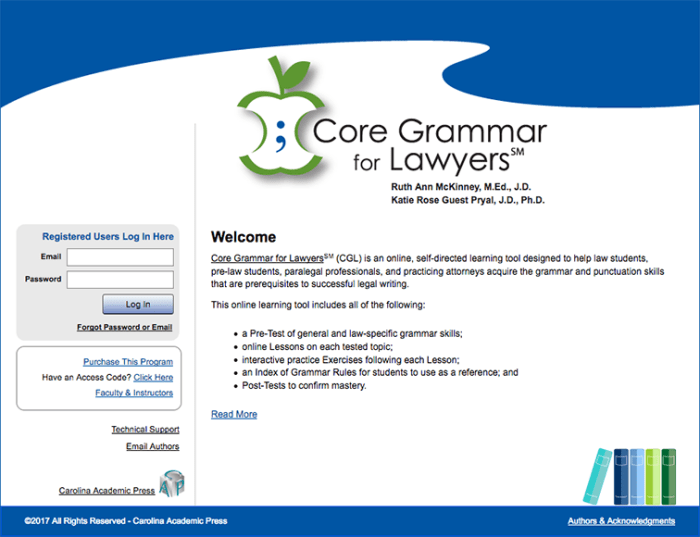In the realm of legal practice, precision and clarity are paramount. Core grammar for lawyers pre test serves as a crucial foundation for effective legal writing, empowering attorneys to convey their arguments with clarity and persuasiveness. This comprehensive guide delves into the essential elements of grammar, exploring their significance in legal communication and providing practical guidance for enhancing writing abilities.
As we embark on this journey, we will examine the fundamental concepts of grammar, including parts of speech, sentence structure, and punctuation. We will uncover common grammatical errors made by lawyers and their potential consequences, emphasizing the importance of clear and concise communication in legal writing.
Furthermore, we will delve into the unique characteristics of legal writing style, such as formality, precision, and objectivity, exploring how grammar enhances the clarity and persuasiveness of legal documents.
Core Grammar Concepts
Core grammar concepts form the foundation of legal writing. They include parts of speech (nouns, verbs, adjectives, adverbs, etc.), sentence structure (subject, verb, object), and punctuation. Understanding these concepts is essential for clear and effective communication in legal documents.
Common grammatical errors made by lawyers include using incorrect verb tenses, misplaced modifiers, and punctuation errors. These errors can lead to ambiguity, misinterpretation, and even legal disputes.
Clear and concise communication is crucial in legal writing. Correct grammar ensures that legal documents are easy to understand and interpret, reducing the risk of errors and misinterpretations.
Legal Writing Style

Legal writing has unique characteristics that distinguish it from other forms of writing. It is formal, precise, and objective. Legal documents must be clear, concise, and unambiguous to avoid misinterpretation and legal disputes.
Grammar plays a vital role in enhancing the clarity and persuasiveness of legal documents. Proper grammar ensures that legal arguments are presented in a logical and structured manner, making them easier to understand and follow.
Using proper grammar also helps to avoid ambiguity and potential misinterpretations. Ambiguous language can lead to legal disputes and ethical violations.
Grammar and Legal Ethics: Core Grammar For Lawyers Pre Test

Maintaining high standards of grammar in legal documents is an ethical obligation for lawyers. Incorrect grammar can lead to misinterpretations, legal disputes, and even ethical violations.
For example, a grammatical error in a contract could lead to a dispute over the parties’ intentions. Similarly, a grammatical error in a court document could lead to a mistrial or an incorrect verdict.
Upholding the integrity of the legal profession requires lawyers to maintain high standards of grammar in all legal documents.
Grammar Resources for Lawyers

| Resource | Description | Benefits |
|---|---|---|
| Legal Writing.net Grammar Guide | Comprehensive online grammar guide specifically tailored for lawyers | Clear explanations, interactive exercises, and downloadable resources |
| The Redbook: A Manual on Legal Style | Official style manual for legal writing published by the American Bar Association | Authoritative guidance on grammar, punctuation, and citation |
| Coursera: Legal Writing Specialization | Online specialization course on legal writing, including a module on grammar | Taught by experienced legal writing professors, with practical exercises and feedback |
Grammar and Legal Technology
Grammar-checking tools and software can assist lawyers in identifying and correcting grammatical errors in legal documents.
These tools use advanced algorithms to check for common grammatical errors, such as incorrect verb tenses, misplaced modifiers, and punctuation errors.
However, it is important to note that grammar-checking tools are not a substitute for human review. Lawyers should always carefully review legal documents for grammatical errors before submitting them.
FAQ Resource
What are the most common grammatical errors made by lawyers?
Common grammatical errors include using incorrect verb tenses, subject-verb agreement issues, misplaced modifiers, and punctuation errors.
Why is it important for lawyers to use proper grammar?
Proper grammar ensures clarity and precision in legal writing, avoiding ambiguity and potential misinterpretations that could impact legal proceedings.
What resources are available for lawyers to improve their grammar skills?
Lawyers can access reputable resources such as books, online courses, and workshops to enhance their grammar skills and refine their legal writing abilities.